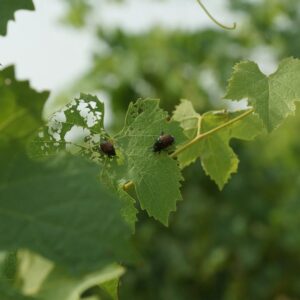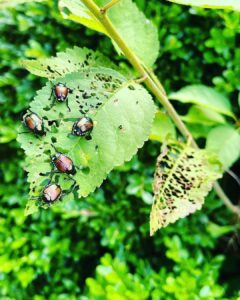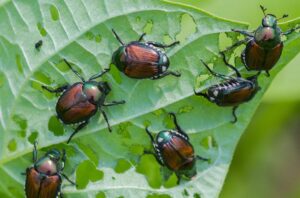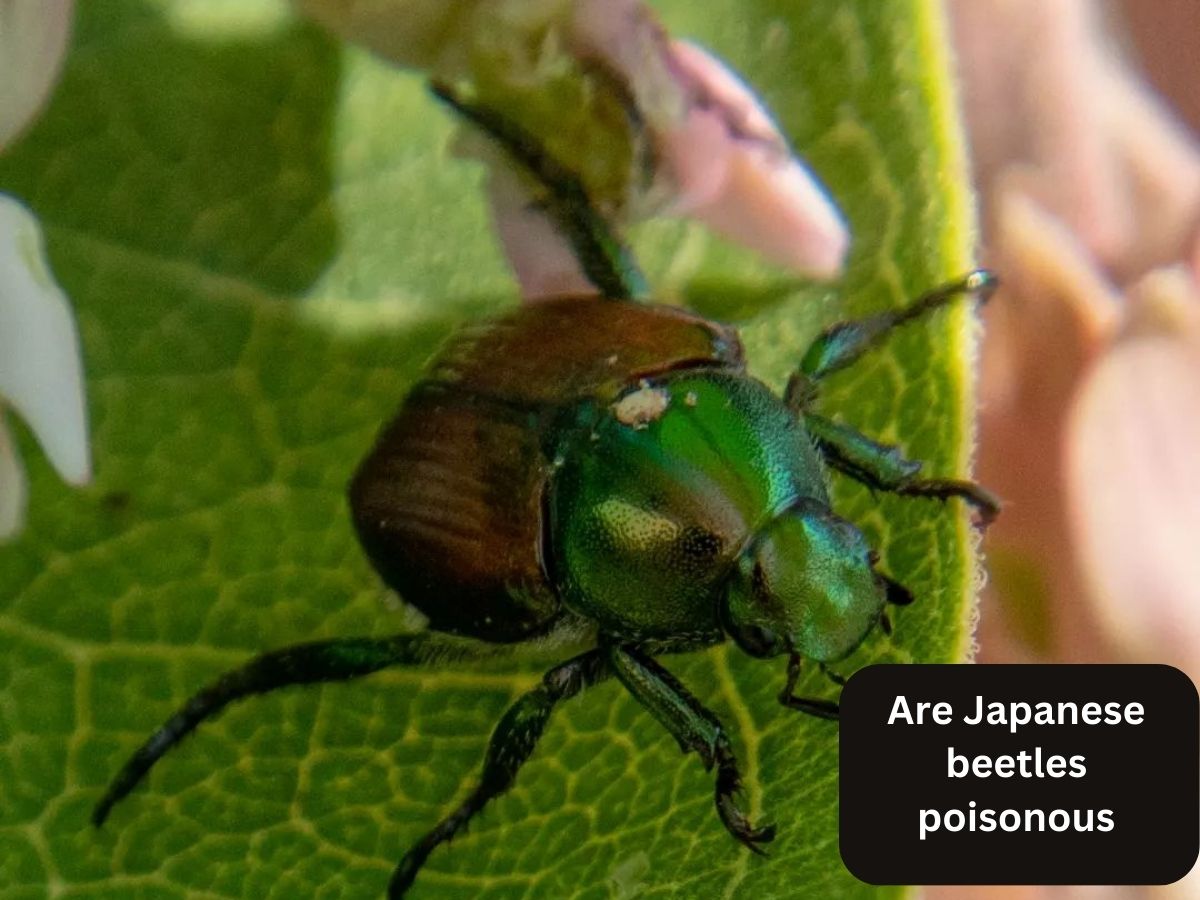Are Japanese beetles poisonous? It’s a question that often crosses the minds of gardeners and homeowners alike. These iridescent green insects with copper-brown wing covers have become quite the notorious guests in North American landscapes. But fear not, for in this blog, we’ll put the rumors to rest and explore the fascinating world of Japanese beetles to uncover the truth.
So, let’s address the burning question: Are Japanese beetles poisonous? The answer is a resounding no. While these beetles may wreak havoc on our beloved plants, they pose no direct threat to us or our furry friends. They don’t produce any toxins or venom harmful to humans or pets. However, handling them may lead to some skin irritation, so it’s always wise to keep a safe distance.
In this article, as an expert in the field, I’ll delve into the life of these garden intruders, their feeding habits, and how to coexist with them peacefully. So, grab your gardening gloves, and let’s uncover the truth about these not-so-poisonous pests!
Japanese Beetles and Plants
Japanese beetles are not picky eaters; they have a wide-ranging appetite and can devour over 300 different plant species. They are especially fond of feasting on ornamental plants, fruits, and vegetables, making them a significant threat to gardens and crops.
When it comes to their feeding habits, adult Japanese beetles are active during the day and are attracted to plants emitting certain volatile compounds. They often gather in groups, making it easier to spot and identify them in your garden. Once they find a suitable host, they begin their feast by consuming the leaves, flowers, and fruits.
The damage caused by Japanese beetles can be devastating. They have a voracious appetite, and in large numbers, they can quickly strip a plant of its foliage. This defoliation weakens the plants, hindering their ability to carry out essential functions like photosynthesis. As a result, the overall health and vitality of the affected plants decline.

Moreover, their feeding activities create entry points for various plant diseases and pathogens. These injuries leave the plants susceptible to infections, further compromising their health. This combination of defoliation and disease susceptibility can lead to significant economic losses in the agricultural and horticultural industries.
As gardeners and farmers, it’s essential to monitor and manage Japanese beetle populations to prevent widespread damage. Implementing preventive measures and adopting responsible pest control strategies can help protect our plants from these hungry invaders. Remember, understanding their feeding habits and preferences empowers us to safeguard our green spaces from the destructive impact of Japanese beetles.
Are Japanese Beetles Poisonous?
The idea that Japanese beetles are poisonous is a prevalent myth that has caused concern among many. However, it’s essential to set the record straight: Japanese beetles do not produce any toxins or venom that can harm humans or pets.
As a species of scarab beetle, Japanese beetles rely on their voracious feeding habits to sustain themselves. They primarily consume plants, leaves, flowers, and fruits, causing significant damage to various plant species. While their feeding behavior can be destructive to gardens and crops, it is important to note that they do not possess any mechanisms for producing poison.
The confusion might arise from the misconception that certain insects, like some ants or beetles, have defensive chemicals or venom to protect themselves from predators. However, Japanese beetles do not fall into this category.
In reality, Japanese beetles are more of a nuisance to gardeners and farmers due to their feeding habits rather than a threat to human health. They are harmless and pose no direct danger to us or our pets. So, rest assured, you can enjoy your garden without fear of these little iridescent-green creatures being poisonous.
Are Japanese Beetles Harmful to Pets?
Japanese beetles are primarily plant feeders and do not pose a direct threat to pets. They are not known to bite, sting, or carry diseases that could harm cats, dogs, or other household pets. As such, if a pet happens to come into contact with a Japanese beetle, it is unlikely to cause any serious health issues.
However, it’s worth mentioning that handling Japanese beetles or having prolonged contact with them may cause minor skin irritations or allergic reactions in some individuals, including pets. These reactions are generally mild and usually involve itching or redness in the affected area.
To ensure your pet’s safety, it’s a good practice to discourage them from interacting with Japanese beetles. In case of accidental contact, you can wash the affected area with mild soap and water. If any concerning symptoms persist or worsen, it’s advisable to consult with a veterinarian.
Overall, while Japanese beetles are not poisonous or directly harmful to pets, it’s still best to keep an eye on your furry companions and prevent them from ingesting large quantities of these beetles or any other potentially harmful insects in the garden. As responsible pet owners, providing a safe and supervised environment for our pets is essential.

Myths and Misconceptions
Myths and misconceptions surrounding Japanese beetles have been a subject of interest for many gardeners and homeowners. Let’s debunk some of the most common ones:
- Myth: Japanese beetles are poisonous to humans.
Fact: Japanese beetles do not produce any toxins or venom harmful to humans. While their feeding can cause damage to plants, they are harmless to us. - Myth: Japanese beetles can bite humans.
Fact: Japanese beetles do not bite humans. They focus solely on devouring plant foliage. - Myth: Japanese beetles can transmit diseases to plants or humans.
Fact: Japanese beetles are not disease vectors. However, their feeding can create openings for plant pathogens to enter and cause infections. - Myth: Attracting Japanese beetles with pheromone traps is an effective control method.
Fact: While pheromone traps can catch some Japanese beetles, they might also attract more to your garden. Using traps can increase localized populations and exacerbate the problem. - Myth: All metallic green beetles are Japanese beetles.
Fact: There are various species of metallic green beetles, but not all of them are Japanese beetles. Other species may have similar appearances but have different habits and behaviors. - Myth: Natural predators alone can completely eradicate Japanese beetle infestations.
Fact: While natural predators, such as birds and insects, play a role in controlling Japanese beetle populations, they may not be sufficient to eliminate infestations. - Myth: Japanese beetle larvae can be controlled by pouring gasoline on the lawn.
Fact: Pouring gasoline on the lawn is not only ineffective but also dangerous and harmful to the environment. It’s crucial to use safe and approved methods for managing larvae. - Myth: Japanese beetles only attack gardens and farmlands.
Fact: Japanese beetles can be found in a variety of habitats, including urban and suburban areas, as well as natural landscapes.
By dispelling these myths and misconceptions, we can better understand the true nature of Japanese beetles and take appropriate measures to manage their populations effectively. Employing responsible and sustainable pest control strategies is essential to strike a balance between preserving our gardens and respecting the diversity of the natural world.
Natural ways to control Japanese Beetles
Controlling Japanese beetles naturally is an eco-friendly and sustainable approach to managing their populations. Here are some effective methods to do so:
- Handpicking: Handpicking is a straightforward and immediate way to control Japanese beetles, especially in small gardens. Simply pick the adult beetles off the plants and drop them into a bucket of soapy water. This will drown them and prevent them from causing further damage.
- Row Covers: Use floating row covers made of lightweight fabric to physically protect plants from Japanese beetles. These covers create a barrier, preventing adult beetles from accessing the plants while still allowing sunlight, water, and air to reach them.
- Companion Planting: Certain plants have natural repellent properties that deter Japanese beetles. Consider planting companions like garlic, chives, tansy, and catnip near susceptible plants to help repel the beetles.
- Neem Oil: Neem oil is a botanical insecticide that disrupts the feeding and growth of Japanese beetle larvae. Dilute neem oil according to the instructions and apply it to the soil around plants to target the larvae.
- Milky Spore Disease: Milky spore (Bacillus popilliae) is a naturally occurring soil-borne bacterium that infects and kills Japanese beetle larvae. Once applied to the soil, it persists for years, providing long-term control.
- Beneficial Nematodes: Certain species of beneficial nematodes (Steinernema and Heterorhabditis) prey on Japanese beetle larvae. Applying nematodes to the soil helps reduce the number of grubs and, consequently, adult beetles.
- Birdhouses and Birdbaths: Attracting birds to your garden by providing birdhouses and birdbaths can encourage natural predators, like starlings and robins, to feed on adult Japanese beetles.
- Manual Traps: Create simple manual traps by placing shallow containers filled with soapy water beneath plants. When beetles are disturbed, they may drop into the water and drown.
- Healthy Garden Practices: Maintaining a healthy garden can reduce the attractiveness of plants to Japanese beetles. Proper watering, appropriate fertilization, and removing dead or damaged plants can make your garden less appealing to these pests.
- Time Plantings Strategically: Consider planting susceptible plants that Japanese beetles prefer later in the season. By the time the plants emerge, the peak beetle activity might have passed, reducing potential damage.
By combining multiple natural control methods, you can effectively manage Japanese beetle populations without resorting to chemical insecticides. These eco-friendly approaches not only protect your garden but also support the overall health of the ecosystem and beneficial insects in your yard.
Chemical Control Options
When it comes to chemical control options for Japanese beetles, there are various insecticides available on the market. However, it’s essential to use them responsibly and as a last resort, as they can also harm beneficial insects and pollinators. Always read and follow the instructions on the product label carefully to ensure safe and effective use.
Here are three of the best pesticides for controlling Japanese beetles available on Amazon:
Ortho Bug B Gon Insect Killer for Lawns and Gardens:

- This insecticide is specifically formulated to target Japanese beetles and other common garden pests.
- It comes in a ready-to-spray bottle, making application easy and convenient.
- The active ingredient is bifenthrin, a synthetic pyrethroid insecticide known for its effectiveness against a wide range of insects.
- Remember to avoid applying this product to flowering plants when bees and other pollinators are active, as it can be harmful to them.
Bayer Advanced 700288S Complete Insect Killer:
This Bayer Advanced insecticide is a granular formulation containing imidacloprid and clothianidin as active ingredients. It provides both systemic and contact control of Japanese beetle larvae and adults. Sprinkle the granules on the soil around affected plants and water thoroughly to activate the insecticide. Be cautious when using this product in areas frequented by pets, and keep pets away from treated areas.

- This product is a granular insecticide that provides season-long protection against Japanese beetle grubs and other soil-dwelling pests.
- It contains imidacloprid, a systemic insecticide that is absorbed by plant roots and then ingested by the beetles as they feed on the plants.
- One application can protect your garden for up to three months, making it a convenient option for long-term control.
- Apply the granules evenly to the soil surface and water them to ensure proper distribution.
Sevin Ready-to-Use 5% Dust:
Sevin dust contains carbaryl as the active ingredient, which is effective against a wide range of garden pests, including Japanese beetles. The ready-to-use dust formulation allows for easy application to affected plants. Apply light dusting to the foliage and flowers where Japanese beetles are active. Avoid using it on windy days to prevent drift and unintended exposure to non-target insects.

- Sevin dust contains carbaryl, a broad-spectrum insecticide effective against Japanese beetles and many other garden pests.
- This dust formulation is easy to apply and can be used on vegetables, fruits, ornamentals, and lawns.
- Avoid using this product on windy days to prevent drift and unintended exposure to non-target insects.
- Keep in mind that carbaryl is toxic to bees and other beneficial insects, so use it with caution and avoid applying it to flowering plants when bees are present.
It’s crucial to remember that pesticides should be used as a last resort and only when non-chemical control methods have been ineffective. Before using any insecticide, consider implementing natural and cultural control measures to manage Japanese beetles. If pesticide use becomes necessary, always follow the product’s label instructions to protect yourself, your garden, and the environment. Additionally, consider consulting with a local gardening expert or extension service for personalized advice on pesticide use in your area.
Are Japanese Beetles Poisonous FAQs?
Can Japanese beetles bite or sting?
No, Japanese beetles cannot bite or sting. They are primarily plant feeders and do not possess any biting or stinging structures. Their mouthparts are adapted for chewing on plant material, especially leaves, flowers, and fruits.
So, if you come across a Japanese beetle, there’s no need to worry about getting bitten or stung by them. However, as with handling any insect, it’s a good idea to be cautious and avoid unnecessary contact to prevent any potential skin irritation.
What attracts Japanese beetles to a garden?
Japanese beetles are attracted to gardens and landscapes by various factors, including:
- The scent of Flowers: Japanese beetles are drawn to the sweet scent of flowers, especially those with bright colors, such as roses, hibiscus, and lilies. These flowers release volatile compounds that act as signals to the beetles, indicating a potential food source.
- Overripe and Decaying Fruits: Ripe and decaying fruits, such as peaches, grapes, and raspberries, emit a strong aroma that attracts Japanese beetles. They are particularly fond of soft, sweet fruits and will readily feed on them.
- Stressed Plants: Plants that are stressed due to drought, nutrient deficiencies, or other factors release chemical signals that can attract Japanese beetles. Stressed plants may be weaker and more vulnerable to beetle feeding, making them a preferred target.
- Warm and Sunny Conditions: Japanese beetles are most active during warm, sunny days. They tend to be less active during cloudy or cooler periods. The weather can influence their activity and feeding patterns.
- Previous Infestations: If Japanese beetles have previously infested an area, the scent of pheromones released by the beetles can attract more individuals to the same location.
To minimize Japanese beetle attraction to your garden, consider employing preventive measures like removing overripe fruits, practicing proper watering and fertilization to maintain plant health, and using companion planting with plants that deter these beetles.

Are Japanese beetles invasive species?
Yes, Japanese beetles (Popillia japonica) are considered invasive species in North America. They are native to Japan, where their populations are naturally controlled by predators and diseases. However, in the early 1900s, Japanese beetles were accidentally introduced to the United States through imported plants. Since then, they have rapidly spread across much of North America.
As invasive species, Japanese beetles have no natural predators in their introduced range, allowing their populations to grow unchecked. This lack of natural control contributes to the challenges of managing their numbers and the damage they cause to plants. Efforts to manage Japanese beetles often focus on minimizing their impact and preventing further spread to new areas.
Conclusion
Japanese beetles may be a common sight in North American gardens, but they are not poisonous to humans or pets. The myth of their harmfulness is debunked, and it’s essential to focus on their plant-feeding habits instead. These voracious insects can cause severe damage to plants, leading to defoliation and weakened vegetation.
However, there are effective and eco-friendly methods to manage Japanese beetle populations. Handpicking, row covers, companion planting, and encouraging natural predators can help control their numbers without resorting to harmful chemical insecticides.
Understanding the factors that attract Japanese beetles, such as the scent of flowers and overripe fruits, allows us to take preventive measures to protect our gardens.
By acting responsibly and employing sustainable pest control strategies, we can strike a balance between maintaining beautiful gardens and preserving the delicate ecosystem of our natural surroundings. Let’s coexist with these fascinating creatures while ensuring the vitality of our green spaces for a greener and healthier future.
